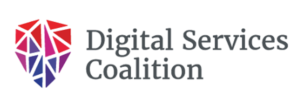DSC Panel Recap: Addressing Accessibility Barriers in the Digital Workplace
By Mike Gifford, Senior Strategist at CivicActions
 The Digital Services Coalition (DSC) celebrated Global Accessibility Awareness Day with a discussion exploring how our member organizations can remove accessibility barriers in a digital workplace. The session focused on strategies for addressing accessibility barriers in the application process and how to support the employee once hired including procuring accessible workplace tech Panelists included:
The Digital Services Coalition (DSC) celebrated Global Accessibility Awareness Day with a discussion exploring how our member organizations can remove accessibility barriers in a digital workplace. The session focused on strategies for addressing accessibility barriers in the application process and how to support the employee once hired including procuring accessible workplace tech Panelists included:
- Lauren Trimble, Bixal
- Angela Fowler, Ad Hoc
- Mike Gifford and Margeaux Salmon-Spring, CivicActions
- Bill Curtis-Davidson and Joiwind Ronen, Wheelhouse Group
Lauren Trimble discussed the variety of challenges that people with disabilities face while applying for jobs. Recruitment methods, inaccessible interview processes, and the pressure for perfection all present barriers for people with disabilities. The first step to improving access is to ensure job postings, applications, and hiring materials have complete information and are compatible with assistive technologies.
Accessibility barriers in the digital workplace were reinforced by Angela Fowler, who detailed her experience being blind and working at a digital agency for the Federal Government. Common accessibility barriers that she has encountered include:
- The use of third-party applications to manage the hiring process. Many assume that these third-party applications are accessible when most are not. It is critical that companies make sure that accessibility is written into any contracts with external partners and to test that software for accessibility before buying it.
- The use of PDF forms, which are notorious for their accessibility limitations but are still widely used.
- Cumbersome processes (additional forms, Doctor’s notes, HR review, etc.) required for employees to report/address accessibility issues.
Instead of finding alternatives to help accommodate those with disabilities, companies should work to change their mindset and ensure that their processes and tools are accessible from the start. If you ensure access, often accommodations are not necessary and people with disabilities can integrate into the workplace more smoothly. Moving to the mindset of ensuring access when considering new technologies and processes may seem daunting, but it is important to remember that if accessibility is an afterthought, your accommodations efforts will be more expensive and fragile.
Current availability of accessible technologies is a challenge, but as companies shift their mindsets towards procuring technologies that are born accessible, vendors will follow suit. Mike Gifford discussed this idea of “shifting left” – thinking about accessibility when purchasing the product instead of when building and customizing the application – and provided a few suggestions for navigating the shift:
- Ask companies what they do to make their product accessible.
- Consider looking beyond requesting a Voluntary Product Accessibility Templates (VPAT) and instead adopt a modern Accessibility Conformance Report like OpenACR.
- Utilize the great resources on accessibility procurement that have been put together by the Partnership on Employment and Accessible Technology and Disability:IN.
Companies prioritizing accessibility and fostering a more inclusive workplace will not only facilitate change in their own workplace, but together can help the entire workforce be more inclusive.
